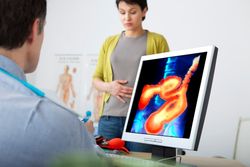A Patient's Guide to Inflammatory Bowel Disease

Cramping, abdominal pain, and irregular bowel movements can be signs of inflammatory bowel disease. This disorder presents many challenges, which is why you should schedule a colonoscopy to confirm the condition with a doctor. The guide below explores the causes of this problem and the available treatment options.
Understanding Inflammatory Bowel Disease
Causes & Risk Factors
There are two types of inflammatory bowel disease (IBD): ulcerative colitis and Crohn’s disease. Ulcerative colitis includes inflammation and sores in the large intestine and rectum. Crohn’s disease occurs where there’s inflammation in the digestive tract that spreads to the surrounding tissue.
Physicians are still trying to determine the cause of IBD. Immune system complications may be the culprit. Disorders may cause the body to react negatively to invasive bacteria in the digestive system. IBD may also be hereditary.
IBD usually develops in patients 30 years old and younger. Cigarette use can contribute to developing Crohn’s disease alongside countless other health complications. Those that take nonsteroidal anti-inflammatory medications like ibuprofen may increase their chances or worsen existing risk factors.
Symptoms
Symptom severity can vary from patient to patient. Common ones include:
- Severe, frequent diarrhea
- Loss of appetite and weight loss
- Bloody stool
- Abdominal pain
Over time, complications tied to IBD could lead to colon cancer or skin, eye, and joint inflammation. Some patients may develop blood clots, and loss of appetite and frequent diarrhea could lead to malnutrition. Each takes a heavy toll on the body, which is why it’s imperative to seek early treatment.
 Treatment & Prevention
Treatment & Prevention
A doctor will recommend a colonoscopy to confirm that you have IBD. They may also test a stool or blood sample. Once you’ve been diagnosed, there are a number of treatment options to explore.
Your doctor may recommend immunosuppressant drugs to control inflammation, and antibiotics to reduce infection. It can take some trial and error to discover the right combination.
In severe cases, your doctor may recommend surgery to remove the colon and rectum. This is a highly effective procedure for ulcerative colitis. Roughly one-half of patients with Crohn’s disease require surgery. Removing damaged parts of the digestive tract can reduce side effects, though the results aren’t always long-term.
Many patients manage the condition by making healthy lifestyle changes. Limiting dairy, high-fat foods, and getting plenty of fiber may reduce flare-ups. Quitting smoking is a must, and using exercise, meditation, and other practices to reduce stress may help.
If you have concerns about IBD, schedule a colonoscopy with Lincoln Surgical Group, P.C. This Lincoln, NE, practice has helped patients since the 1930s. They offer a wide scope of services, including surgery, wound care, and hernia treatment. Visit their website to learn more about their services and call (402) 483-7825 to schedule a consultation.
About the Business
Have a question? Ask the experts!
Send your question

